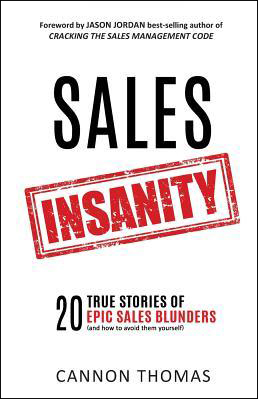INSIDER: Sales Insanity
Jorge Trevino, MBA Candidate
 Cannon Thomas, a retired management consultant, dedicated his career to helping organizations strengthen their sales force while improving the bottom line for senior executives. Throughout the course of his career, Thomas realized that the conventional, accepted way of doing things was not always the best course of action. Your way of selling a listing might not work for another realtor. Your way of organizing an open house might not be the same way another realtor might set up theirs. As a sales person, one must always be ready to embrace the challenges that the selling environment poses in your professional life. Thomas highlights the importance of adapting to the ever-changing sales environment to be the most productive sales person you can be.
Cannon Thomas, a retired management consultant, dedicated his career to helping organizations strengthen their sales force while improving the bottom line for senior executives. Throughout the course of his career, Thomas realized that the conventional, accepted way of doing things was not always the best course of action. Your way of selling a listing might not work for another realtor. Your way of organizing an open house might not be the same way another realtor might set up theirs. As a sales person, one must always be ready to embrace the challenges that the selling environment poses in your professional life. Thomas highlights the importance of adapting to the ever-changing sales environment to be the most productive sales person you can be.
Sales Insanity, what can almost be considered an autobiography of Cannon Thomas’ career, recounts 20 unique stories of times where things just did not go the right way. Rather than retelling the stories where Thomas helped an organization close its largest sale to date or the time when he transformed an organization’s sales force to lower costs and increase revenues, he tells 20 floundering stories where organizations did not get it right the first, second, or third time and ultimately experienced utter failure. Thomas formats Sales Insanity in this manner so readers won’t make the same mistakes these organizations and sales teams made.
THINK POINT #1: Best Practices Aren’t the Best Practices
Best practices are defined through dictionary.com as “commercial or professional procedures that are accepted or prescribed as being correct or most efficient.” Essentially, best practices are the accepted norms that have been entrenched in the mindset of the specific industry in which you’re participating. For so long, best practices have been an organization’s life support with executives and salespeople alike relying on such methods to produce maximum results. However, what if best practices aren’t always the “best” methods to follow?
The idea of a worst practice defining an organization’s procedures and processes is coined by Cannon Thomas himself, a practical theory he has utilized through many years in the workforce as a salesperson, sales manager, and consultant. Thomas explains that a worst practice is a “terribly bad idea that’s been terribly executed and results in terribly wrong outcomes.” Worst practices are failures that have resulted in layoffs, firings, and bankruptcies, but Thomas emphasizes that salespeople, sales managers, and entire organizations learn best from utter failures. Think about a time when you struggled to sell one of your listings. Did you make a mistake? What do you think went wrong? We have all experienced failure, but how will you learn from it to capitalize on future opportunities for growth and success?
THINK POINT #2: Empower the Customer Throughout the Sales Process
As a real estate agent, it is important to understand conceptually what the sales process entails, the important stakeholders, and the ultimate objective that is to be accomplished. By understanding the intricacies involved throughout the sales process, the agent is better equipped to empower clients during their search for a new home, while maximizing commission at the end of the sale. As a facilitator during the sales process, the salesperson’s primary jobs are to understand the client’s main objective and help them achieve their objective through preparation, education, and freedom of choice. The client is the most important stakeholder during the sales process—without the client, there is no sales process, thus, the client must be empowered by the salesperson.
Thomas encourages all salespeople to utilize the following tips in order to empower the customer throughout the sales process:
- Before approaching potential customers, think about how you can provide the best service possible and enable them to reach their objectives. It’s about the quality of the sales effort, not the quantity.
- Establish a trustworthy relationship during the sales process so clients feel the intimacy and value you represent throughout the sales process.
- Give the customer the benefit of the doubt. Frequently, the client is the most motivated stakeholder during the sales process—rather than having the client meet your demands as the salesperson, the salesperson should undoubtedly meet the demands of the client.
THINK POINT #3: Productivity = Effectiveness x Efficiency
Finally, Thomas highlights the importance of productivity as a salesperson, which he defines as the product of effectiveness and efficiency. Essentially, the difference between both components boils down to accomplishing something and how well you accomplish it. An agent can be effective by posting listings on local newspaper, magazine, and social media websites. Likewise, an agent can be effective by responding to all voicemails and emails, setting up open houses for popular listings, and attending all their daily meetings. At first glance, this agent is certainly the most productive agent in the group; however, the most important consideration is how those actions are translating into closings. If the daily actions aren’t translating into results, the daily actions aren’t truly productive.
 As a salesperson, you should always be ready for prospective customers by having a comprehensive understanding about what your client needs and what your client wants. Do you just post your listing or are you conducting substantive research about the features of the house and surrounding neighborhood and community? Are you solely responding to the dozens of emails and voicemails you have not caught up on or do you intend to have meaningful conversations with prospective clients about the wants and needs of their future home? Rather than just walking clients through properties pointing out obvious elements of the home, help them envision their life in this home by idealizing where furniture would be placed or how their children will be successful in the local school district.
As a salesperson, you should always be ready for prospective customers by having a comprehensive understanding about what your client needs and what your client wants. Do you just post your listing or are you conducting substantive research about the features of the house and surrounding neighborhood and community? Are you solely responding to the dozens of emails and voicemails you have not caught up on or do you intend to have meaningful conversations with prospective clients about the wants and needs of their future home? Rather than just walking clients through properties pointing out obvious elements of the home, help them envision their life in this home by idealizing where furniture would be placed or how their children will be successful in the local school district.
How will you define effectiveness? How will you define efficiency? Leverage your strengths, capabilities, and resources, whether it be a vast network, diligent work ethic, or savvy technical skills, in order to be the most productive salesperson you can be.
Conclusion
In conclusion, utter failure is not the end of the world. By examining the sales blunders and utter failures Thomas experienced and witnessed, we learn that knowledge can be obtained from worst practices, the salesperson should empower the customer throughout the sales process, and salespeople need to be both effective and efficient in order to be considered productive.
. . . . . . . . . . . . . . . . . . .
Recommended Reading
Thomas, Cannon (2017), Sales Insanity, 20 True Stories of Epic Sales Blunders (and how to avoid them yourself), Ivy House Publishing.
. . . . . . . . . . . . . . . . . . .
Reference
Best practices (2018), Dictionary.com, http://www.dictionary.com/browse/best-practice
. . . . . . . . . . . . . . . . . . .
About the Author
Jorge Trevino, MBA Candidate
Baylor University
Jorge Trevino is a graduate student from Brownsville, Texas. He earned his Bachelor of Arts in Health and Society along with a Certificate in Business Foundations and a Certificate in the Business of Healthcare from The University of Texas at Austin in 2017. Jorge is currently seeking an MBA in Healthcare Administration through the Robbins Institute for Health Policy and Leadership. He plans to pursue a career as a healthcare executive focusing on hospital operations.